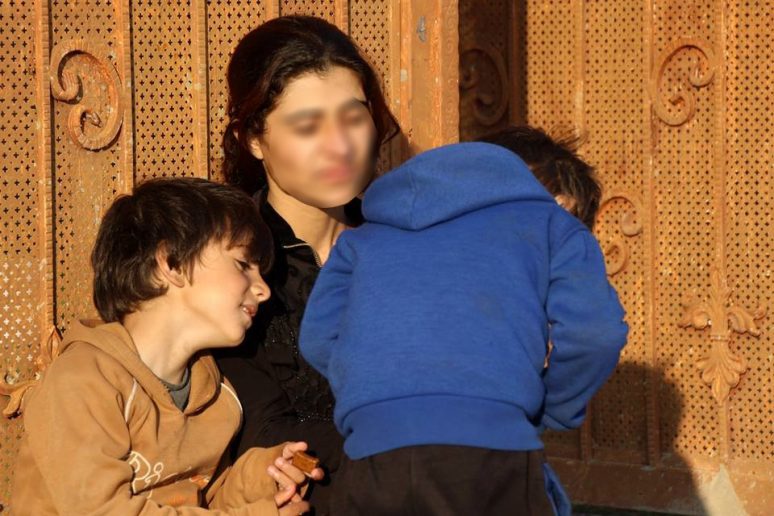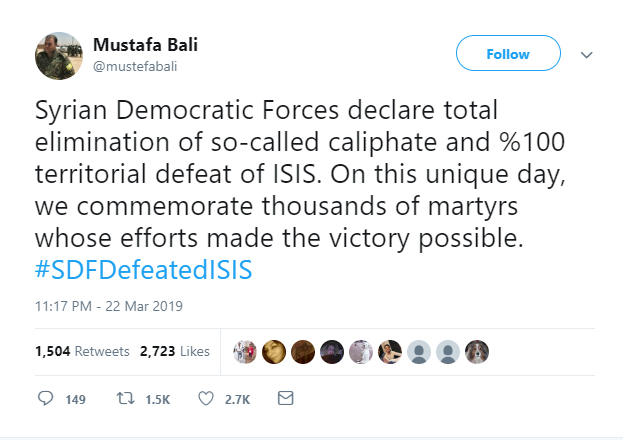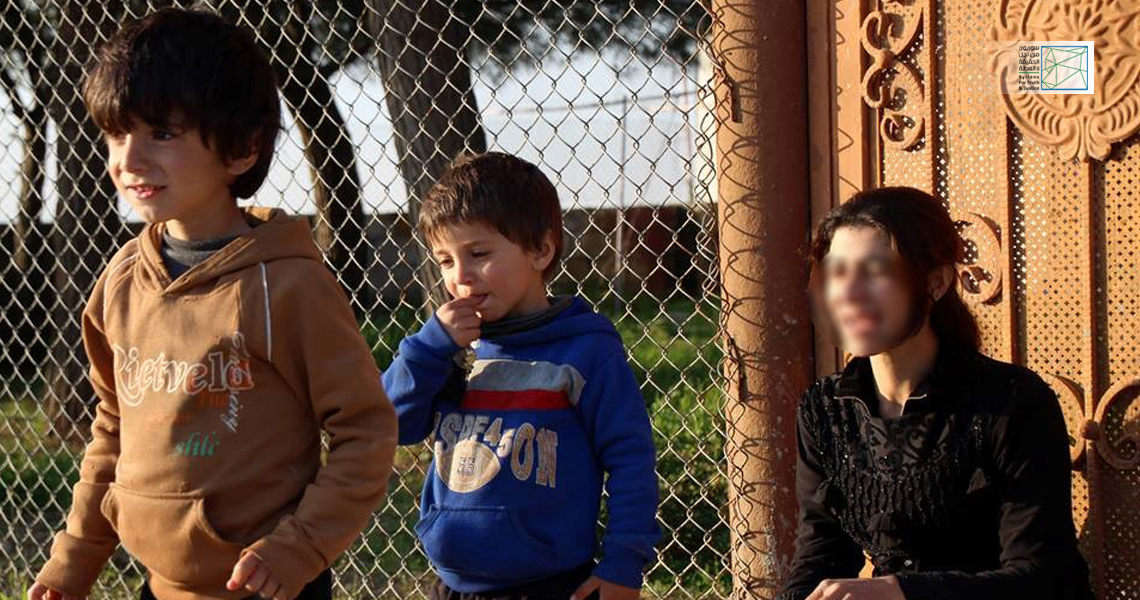Introduction
Barava Khalaf Farho was 21 when she was captured with her two children in 2014 by the Islamic State (IS) in Iraq’s Sinjar (also known as Shingal). she had never imagined to spend five years in agony being used as a sex slave. Barva managed to escape slavery with her two children by fleeing the town of Al-Baghuz Tahtani in the province of Deir ez-Zur -the last IS stronghold in Syria- with other large influx of civilians,[1] as battles between the Islamic State and Syrian Democratic Forces (SDF) drew to an end and before the latter took full control on the town on March 22, 2019.[2] Barva took refuge in the Yazidi House,[3] located in the village of Qazlajoukh in rural Amuda, from where she recounted to STJ her tale of suffering on February 25, 2019. Barva said:
“IS commanders ordered to evacuate women and children from Al-Baghuz, assuring that we were in a truce with the enemies (SDF) who would took us to camps safely”
According to STJ field researcher, among those civilians who fled the town of Al-Baghuz there were many women and children who had been kidnapped from Sinjar and its surroundings, specifically in August 2014.
The United Nations High Commissioner For Refugees (UNHCR) said on February 19, 2019 that some 20,000 people fled IS controlled areas in eastern Deir-ez-Zur province in recent weeks and are now held in makeshift IDPs camps run by Kurdish armed groups including the US-backed SDF forces.[4]
1. They separated me and my children from the husband and father
On the second day after the end of the Yazidi fasting month, specifically on August 3, 2014, at 2.00 am., IS fighters attacked the Yazidi-majority villages of Sinjar; capturing women, kidnapping children and killing men, according to Barva.
Barva was transferred with her children to the city of Tal Afar in Iraq, where she was kept for about a year before being taken to the Syrian city of Raqqa, the then IS capital. She recalled:
“They brought us to the city of Tal Afar in Iraq, where we stayed for about one year. Then they separate women, men and children from each other. They took my husband away and transferred me with my two children to the city of Raqqa and held us there for long.”
Barva’s years in Raqqa were the worst and roughest of her life. IS fighters sold and bought her as a slave several times without any of them marrying her.

Barva with her two children in the Yazidi House. February 25, 2019. Photo credit: STJ.
2. “IS women used to torture and ill-treat us more than men”
Barva recalled with sorrow her years of slavery to IS fighters in Raqqa saying:
“That was incredible, they trafficked Yezidi girls and women. My living conditions, however, were better than that of many other slaves. But what really hurt was the use of our elderly women as servants by IS fighters’ young wives. They forced them to do all the housework even tidying up their beds, toiletries and makeup kits and taking care of their children, with changing their dirty diapers. Actually, they didn’t treat us like humans.”
Barva doesn’t remember exactly the number of times she was bought and sold by IS fighters, but estimated it to be likely four or five. She recalled that the first one who bought her used to treat her as a daughter and allowed her to take care of her children. She stayed at his house for one year before selling her to another who used her badly. She said:
“We were often been tortured and ill-treated by IS women more than men. Therefore, the third fighter who bought me told his wife that I would stay with them temporarily because he wanted to sell me for profit, so she wouldn’t torture me. They already had a Yazidi slave, who was subjected to violence and various kinds of humiliation, as they used to call for her in the midnight to massage their legs or to change their children’s clothes or diapers.”
Barva doesn’t know the real names of those who bought and sold her, since each had more than one alias. One of them, for instance, was called by his household Abu Ahmed, while others used to call him Abu Ali. Barva recalled how the Yazidi girls had been humiliated by IS members; being traded and forced to dress scandalously to be more attractive in order to be sold faster and at a higher price. She said:
“They forced us to pray, but didn’t teach us the Islam beliefs and practices. However, every time they asked me if I know how to pray, I said yes, in order not to be punished.”
Barva and her children left Raqqa with several IS members, in October 2017, 15 days before the city was taken by SDF.[5]
3. I don’t know the fate of my husband
Barva doesn’t know what happened to her husband who disappeared by IS members ten months after being held by them. She said that IS members changed the names of her sons; as they used to call Jakar as Mohammad and Jan as Ahmed:
“My younger son was nine months of age when they took his father. The Yazidi slaves used to stand helpless before their hungry and thirsty children. Despite serving them and their visitors all the time, IS members weren’t satisfied with that.”
While staying in Raqqa with IS Russian women, Barva and her children became familiar with Russian language and fluent in Arabic also.
4. Fear of going out to safe zones
Following her removal from the city of Raqqa, Barva and her two children were transferred to Deir ez-Zur province, where they stayed for a year and a half, moving from one place to another-often with Russian women- to escape the shelling and fighting, before she managed to reach SDF areas. She said:
“We used to move from one place to another because of bombings, until we got trapped in the town of Al-Baghuz. We were locked and dared not leaving our shelters, even to fetch water, for fear of sniper fire and bombardments. Only those who hid in holes could be safe while others were prepared to die any time.”
During that period Barva and her children were homeless staying on streets; there was no place to shelter them from bombings or the chilly weather. Barva knew that she was not alone facing such conditions, but many other Yazidi women and children did, though she was not able to recognize them from other women for being veiled. Regarding this she said:
“We refused to leave the town of Al-Baghuz, but they drove us out under the pretext that we were hindering them in fighting and defending themselves. We were too afraid of getting out but we had no other choice, since they warned us of certain death, injury and hunger.”
The local news network ‘Euphrates Post’ released an audio recording of an IS member giving a public speech on the terms of the agreement with the SDF forces to evacuate women and children to makeshift camps run by the Kurds.[6]
5. I’ll never forget those dark days I spent at the mercy of IS
Barva is still living with the hope of returning to her village in Sinjar and reuniting with her parents whom she terribly missed. She said:
“I miss my parents so much and hope to see them soon. But what hurts me most is the disappearance of my husband. I’ll never forget those dark days I spent at the mercy of IS.”
Barva said that she knew nothing about the alleged massacre committed by IS on February 25, 2019, against 50 Yazidi women in the town of Al-Baghuz, east of Euphrates in Deir ez-Zur province.[7]
SDF announced regaining full control on the Al-Baghuz, the last IS stronghold in Dri ez-Zur, though a tweet by the head of its media office Mustafa Bali saying:
“Syrian Democratic Forces declare total elimination of so-called caliphate and %100 territorial defeat of ISIS. On this unique day, we commemorate thousands of martyrs whose efforts made the victory possible.”

The tweet of SDF’s media office head Mustafa Bali on March 22, 2019. Photo credit: Mustafa Bali’s official Twitter account.
Head of the Yazidi Abductees’ Affairs’ Office in Iraqi Kurdistan Hussein al-Qaidi disclosed on March 28, 2019 the release of 45 women and children Yazidis from Syria since the beginning of the year, and that there is no information available about mass graves containing Yazidi women in the town of Al-Baghuz, as the Office’s task force in Syria found no physical evidence.[8]
—————————-
[1] SDF spokesman Kino Gabriel announced through a press conference held in the town of Al-Susah near Al-Baghuz that some 30,000 IS members and their families surrendered to SDF, since January 9, 2019, including more than 5,000 fighters, in addition he reported the evacuation of more than 34,000 civilians from the last IS enclave in Syria, Sky News Arabia, March 17, 2019: https://www.skynewsarabia.com/middle-east/1236539-%D8%B3%D9%88%D8%B1%D9%8A%D8%A7-%D8%AE%D8%B1%D9%88%D8%AC-%D8%A7%D9%94%D9%83%D8%AB%D8%B1-60-%D8%A7%D9%94%D9%84%D9%81-%D8%B4%D8%AE%D8%B5-%D8%A8%D8%AF%D8%A1-%D9%85%D8%B9%D8%B1%D9%83%D8%A9-%D8%A7%D9%84%D8%A8%D8%A7%D8%BA%D9%88%D8%B2.
[2] On September 9, 2017, SDF launched the al-Jazeera Storm operation against IS fighters in the eastern part of the province of Deir ez-Zor concurrently with a campaign by the government forces against those in the western province and the Euphrates line. Those battles resulted in the full control over the eastern part of Deir ez-Zor on March 22, 2019.
[3] The Yazidi House is a civilian establishment founded in 2012 to handle the people’s affairs in north and north-east Syria and to accommodate the Yazidis fleeing IS thus to contact their relatives and get them back to their hometowns in Sinjar.
[4] “Syria: Bachelet alarmed by upsurge in attacks and civilian casualties in Idlib”, UNHCR, February 19, 2019 https://www.ohchr.org/EN/NewsEvents/Pages/DisplayNews.aspx?NewsID=24178&LangID=E.
[5] SDF forces, backed by the US-led coalition, managed to control the city of Raqqa on October 20, 2017 after more than four-month battles, during which many civilians died while others remain unaccounted for.
[6] The Euphrates Post: terms of the agreement between IS and the coalition in Al-Baghuz, February 25, 2109 https://www.youtube.com/watch?v=oH6ef1bdAy8&feature=youtu.be&fbclid=IwAR2zd8ANxKxij95EmaU1ttM8a_ejzcoM18h8eAOQj_WL6j18j8omzgcYApU.
[7] “The Discovery of a Horrible Slaughter against Yazidi Women”, Sky News Arabia, February 25, 2019 https://www.skynewsarabia.com/video/1230628-%D9%83%D8%B4%D9%81-%D9%85%D8%B0%D8%A8%D8%AD%D8%A9-%D9%85%D8%B1%D9%88%D8%B9%D8%A9-%D8%A7%D8%B1%D8%AA%D9%83%D8%A8%D8%AA-%D8%A8%D8%AD%D9%82-%D8%A7%D9%95%D9%8A%D8%B2%D9%8A%D8%AF%D9%8A%D8%A7%D8%AA.
[8] “The Barzani’s party calls on the government to verify claims about finding heads of dozens of slaughtered women and releases children from ISIL grip”, Al- Hayat Newspaper, February 28, 2019: shorturl.at/cfkvM.

